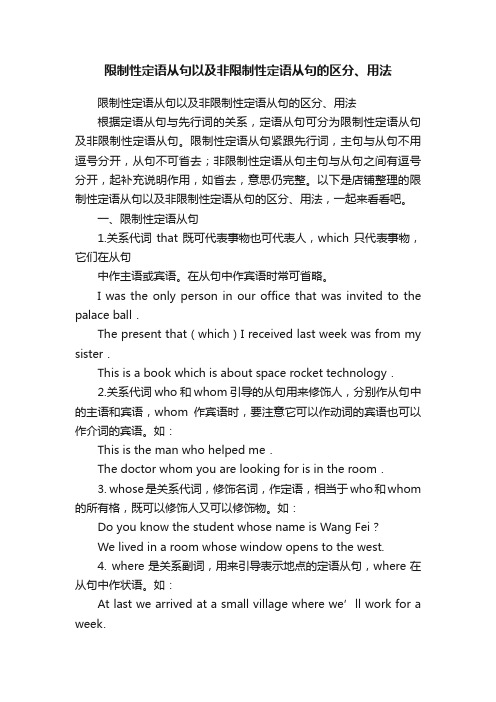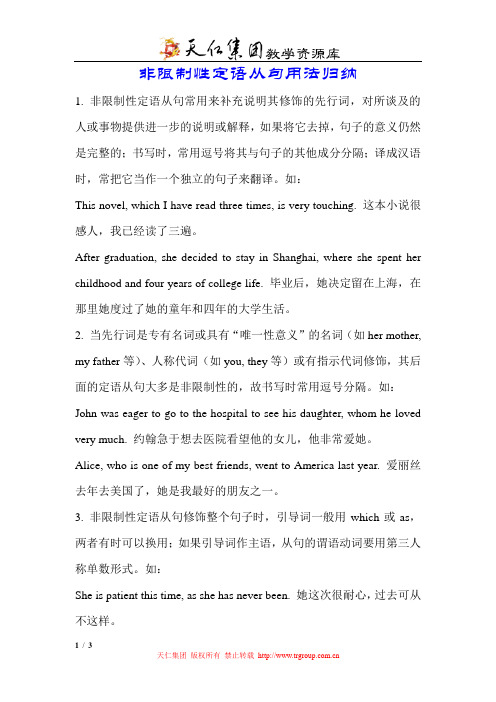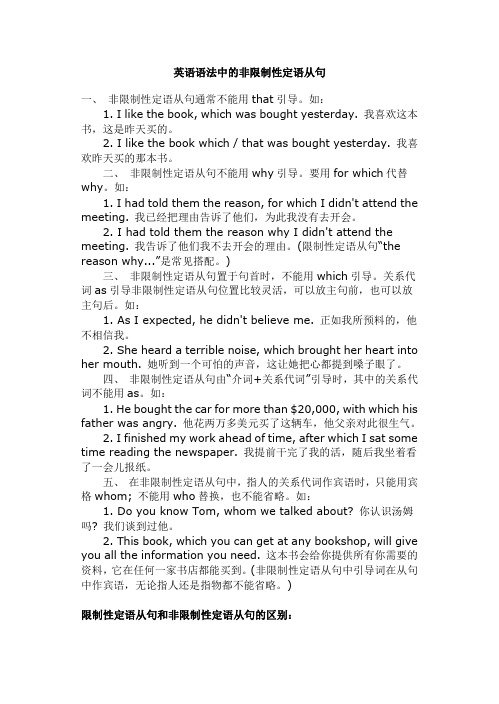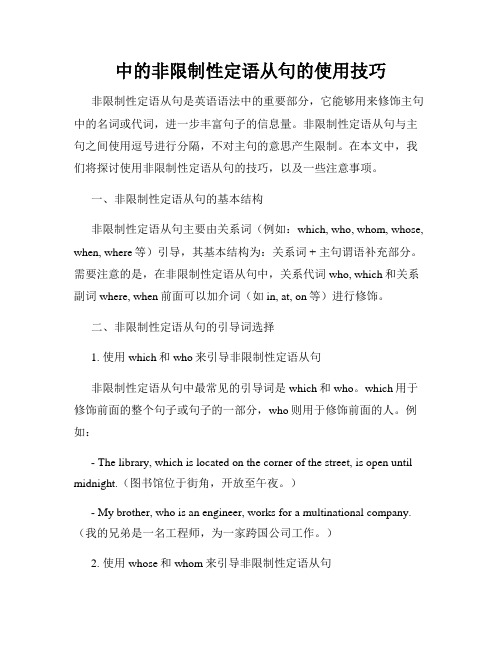非限制性定语从句用法
限制性定语从句以及非限制性定语从句的区分、用法

限制性定语从句以及非限制性定语从句的区分、用法限制性定语从句以及非限制性定语从句的区分、用法根据定语从句与先行词的关系,定语从句可分为限制性定语从句及非限制性定语从句。
限制性定语从句紧跟先行词,主句与从句不用逗号分开,从句不可省去;非限制性定语从句主句与从句之间有逗号分开,起补充说明作用,如省去,意思仍完整。
以下是店铺整理的限制性定语从句以及非限制性定语从句的区分、用法,一起来看看吧。
一、限制性定语从句1.关系代词that既可代表事物也可代表人,which只代表事物,它们在从句中作主语或宾语。
在从句中作宾语时常可省略。
I was the only person in our office that was invited to the palace ball.The present that(which)I received last week was from my sister.This is a book which is about space rocket technology.2.关系代词who和whom引导的从句用来修饰人,分别作从句中的主语和宾语,whom作宾语时,要注意它可以作动词的宾语也可以作介词的宾语。
如:This is the man who helped me.The doctor whom you are looking for is in the room.3. whose是关系代词,修饰名词,作定语,相当于who和whom 的所有格,既可以修饰人又可以修饰物。
如:Do you know the student whose name is Wang Fei?We lived in a room whose window opens to the west.4. where是关系副词,用来引导表示地点的定语从句,where在从句中作状语。
如:At last we arrived at a small village where we’ll work for a week.5. when是关系副词,引导定语从句表示时间,在从句中作状语。
非限制性定语从句知识点总结

非限制性定语从句知识点总结非限制性定语从句是英语语法中的一个重要知识点,对于准确、丰富地表达语言有着重要作用。
接下来,让我们系统地了解一下非限制性定语从句的相关内容。
一、非限制性定语从句的定义非限制性定语从句是对先行词进行补充说明的从句,它与先行词的关系不是十分紧密,即使去掉从句,主句的意思仍然完整。
它与限制性定语从句的一个重要区别在于,非限制性定语从句在先行词和从句之间通常用逗号隔开。
例如:“My father, who is a doctor, works very hard”在这个句子中,“who is a doctor”就是一个非限制性定语从句,先行词是“my father”。
如果去掉这个从句,“My father works very hard”这个主句的意思仍然清晰完整。
二、非限制性定语从句的引导词1、关系代词(1)which:which 可以指代物,在从句中作主语、宾语等成分。
例如:The house, which was built in 1980, needs repairing (which 指代“the house”,在从句中作主语)(2)who:who 指代人,在从句中作主语。
例如:Mr Smith, who has just come from abroad, is very kind (who 指代“Mr Smith”,在从句中作主语)(3)whom:whom 指代人,在从句中作宾语。
例如:The girl, whom I met yesterday, is very friendly (whom 指代“the girl”,在从句中作宾语)(4)whose:whose 可以指代人或物,在从句中作定语。
例如:The boy whose father is a teacher studies very hard (whose 指代“the boy”的,在从句中作定语)2、关系副词(1)when:when 在从句中作时间状语。
非限制性定语从句用法归纳

非限制性定语从句用法归纳1. 非限制性定语从句常用来补充说明其修饰的先行词,对所谈及的人或事物提供进一步的说明或解释,如果将它去掉,句子的意义仍然是完整的;书写时,常用逗号将其与句子的其他成分分隔;译成汉语时,常把它当作一个独立的句子来翻译。
如:This novel, which I have read three times, is very touching. 这本小说很感人,我已经读了三遍。
After graduation, she decided to stay in Shanghai, where she spent her childhood and four years of college life. 毕业后,她决定留在上海,在那里她度过了她的童年和四年的大学生活。
2. 当先行词是专有名词或具有“唯一性意义”的名词(如her mother, my father等)、人称代词(如you, they等)或有指示代词修饰,其后面的定语从句大多是非限制性的,故书写时常用逗号分隔。
如:John was eager to go to the hospital to see his daughter, whom he loved very much. 约翰急于想去医院看望他的女儿,他非常爱她。
Alice, who is one of my best friends, went to America last year. 爱丽丝去年去美国了,她是我最好的朋友之一。
3. 非限制性定语从句修饰整个句子时,引导词一般用which或as,两者有时可以换用;如果引导词作主语,从句的谓语动词要用第三人称单数形式。
如:She is patient this time, as she has never been. 她这次很耐心,过去可从不这样。
Yellow Stone National Park, which is in Wyoming, is one of the most beautiful national parks in the world. 黄石国家公园位于怀俄明州,是世界上最美丽的国家公园之一。
英语语法中的非限制性定语从句

英语语法中的非限制性定语从句一、非限制性定语从句通常不能用that引导。
如:1. I like the book, which was bought yesterday. 我喜欢这本书,这是昨天买的。
2. I like the book which / that was bought yesterday. 我喜欢昨天买的那本书。
二、非限制性定语从句不能用why引导。
要用for which代替why。
如:1. I had told them the reason, for which I didn't attend the meeting. 我已经把理由告诉了他们,为此我没有去开会。
2. I had told them the reason why I didn't attend the meeting. 我告诉了他们我不去开会的理由。
(限制性定语从句“the reason why...”是常见搭配。
)三、非限制性定语从句置于句首时,不能用which引导。
关系代词as引导非限制性定语从句位置比较灵活,可以放主句前,也可以放主句后。
如:1. As I expected, he didn't believe me. 正如我所预料的,他不相信我。
2. She heard a terrible noise, which brought her heart into her mouth. 她听到一个可怕的声音,这让她把心都提到嗓子眼了。
四、非限制性定语从句由“介词+关系代词”引导时,其中的关系代词不能用as。
如:1. He bought the car for more than $20,000, with which his father was angry. 他花两万多美元买了这辆车,他父亲对此很生气。
2. I finished my work ahead of time, after which I sat some time reading the newspaper. 我提前干完了我的活,随后我坐着看了一会儿报纸。
中的非限制性定语从句的使用技巧

中的非限制性定语从句的使用技巧非限制性定语从句是英语语法中的重要部分,它能够用来修饰主句中的名词或代词,进一步丰富句子的信息量。
非限制性定语从句与主句之间使用逗号进行分隔,不对主句的意思产生限制。
在本文中,我们将探讨使用非限制性定语从句的技巧,以及一些注意事项。
一、非限制性定语从句的基本结构非限制性定语从句主要由关系词(例如:which, who, whom, whose, when, where等)引导,其基本结构为:关系词 + 主句谓语补充部分。
需要注意的是,在非限制性定语从句中,关系代词who, which和关系副词where, when前面可以加介词(如in, at, on等)进行修饰。
二、非限制性定语从句的引导词选择1. 使用which和who来引导非限制性定语从句非限制性定语从句中最常见的引导词是which和who。
which用于修饰前面的整个句子或句子的一部分,who则用于修饰前面的人。
例如:- The library, which is located on the corner of the street, is open until midnight.(图书馆位于街角,开放至午夜。
)- My brother, who is an engineer, works for a multinational company.(我的兄弟是一名工程师,为一家跨国公司工作。
)2. 使用whose和whom来引导非限制性定语从句当在非限制性定语从句中修饰前面名词的所有格形式时,我们可以使用关系代词whose。
而whom则用于修饰前面的人,并在从句中作为宾语出现。
例如:- We visited our neighbors, whose daughter is a famous pianist.(我们去拜访了我们的邻居,他们的女儿是一位有名的钢琴家。
)- He invited his colleagues, some of whom attended the conference.(他邀请了他的同事,其中一些人参加了这个会议。
非限制性定语从句which用法

非限制性定语从句which用法
非限制性定语从句是一类重要的从句,它可以用来给主句中的名词、代词、动词或短
语增添额外的信息,相当于限制性定语从句的补充,故它存在的最大功能就是作补充,用which引导的非限制性定语从句只要求在句子中可以被省略,但这个句子的意思不受影响,通常可用逗号将非限制性定语从句与主句parenthesis割开,也可以用which来引出从句。
非限制性定语从句which用法,可以在句中作状语、宾语或表语,用以丰富句子,使
之更加生动、形象。
1.用以表示时间、方式、原因、条件等。
例句:He went to Beijing, which he had visited many times before.
他去了北京,他以前曾多次去过这里。
2.用以表示主句动作结束成功与否:
他建了一幢房子,一年后就完工了。
1.主句有以下形式:不定式、动词-ing形式、would like/have/,etc. 动词表示请求、建议、建议等。
她建议我们去看电影,我很乐意接受。
2.宾语从句里引导词是that 或whether:
他要求我参加会议,我同意去。
1. 主句中动词具有判断、比较意义:如be different from/similar to比较级
adj.+than, be proper/impropper等;
他们是在同一个领域工作的,但结果他们的观点却不一样,这让我们感到很惊讶。
2. 主句中动词具有承认、满足、证实等意义:如admit/acknowledge, verify, gratify等;
事实最终被证实,这让我们都很高兴。
非限制性定语从句
games and songs. 6. He is absorbed in work, ____he often was.
hometown,will open next year. 3. We shouldn’t spent our money testing so many people, most of
_____are healthy 4. Chan’s restaurant on Baker Street, ____used to be poorly run, is now
(2)Xi’an, which we visited last year, is really a beautiful city.
(3) My favorite season is autumn, when we celebrate the Mid-Autumn
Festival.
2. 在限制性定语从句中,作宾语的关系代词可以省略,但在非限制性 定语从句中,作宾语的关系代词不能省略。如:
(1)His father, who is a famous actor, will go to Canada next week.
(2)I was born in Beijing, which is the capital of China. 2. 当先行词被指示代词、形容词或物主代词修饰时,要用非限制性定 语从句。如:
练习: 1. His movies won several awards at the film festival, _____was beyond
限制性定语从句与非限制性定语从句
∙非限制性定语从句的概念:非限制性定语是对被修饰名词或代词的附加说明,它不是必需的,如果去掉,也不会影响句子的意思,它与被修饰名词之间通常用逗号分开。
如:The travellers, knowing about the floods, took another road. 游客们知道发了大水,都改道走了。
The boys, wanting to play football, were disappointed when it rained. 那些男孩子想踢足球,因为下雨感到失望。
∙非限制性定语从句用法:1、引导非限定性定语从句时,只能用which(不用that)。
例如:Heat is another form of energy, which is as important as other kinds of energy.热是另一种形式的能量,与其他形式的能量一样重要。
(从句表补充说明,而且关系代词which不能换成that。
)2、引导非限定性定语从句的which可以指代前面的先行词,也可以指前面整个句子的含义。
例如:That Peter will marry Alice, which has not been announced yet, has spread around.彼特要娶爱丽斯这件事还没宣布,却已传得沸沸扬扬。
(句子中的which指“彼特要娶爱丽斯”这整个句子的意思。
)3、除which外,还可用when,where,who等关系代、副词引导非限定性定语从句。
例如:After graduation, I decided to stay in Chongqing, where I spent my childhood and four years of college life.毕业后,我决定留在重庆,在那里我曾度过了我的童年和四年大学生活。
Albert Einstein left Germany for the United States during World WarII, when Jews were badly treated in Germany.第二次世界大战期间,爱因斯坦离开德国去了美国,那时犹太人在德国受到不好的对待。
定语从句与非限制性定语从句的区别与用法
定语从句与非限制性定语从句的区别与用法定语从句和非限制性定语从句是英语语法中重要的修饰从句。
尽管它们都是用来修饰名词或代词,但在使用方式和功能上存在一些区别。
本文将详细介绍这两种从句的区别和用法。
1. 定语从句的定义及用法定语从句是一种修饰先行词的从句,它通常通过关系代词(如that, who, which, whom, whose)或关系副词(如when, where, why)引导,限制或限定先行词的范围。
它提供了更多关于先行词的信息,帮助我们更准确地理解该先行词。
定语从句的位置通常紧跟在先行词之后,修饰先行词。
在句子中,定语从句可以用于修饰人、物、地点、时间等各种名词。
例如:The book that he borrowed from the library was very interesting.他从图书馆借来的那本书非常有趣。
在这个例子中,定语从句“that he borrowed from the library”修饰先行词“book”,增加了对这本书的描述。
2. 非限制性定语从句的定义及用法非限制性定语从句也修饰先行词,但它提供的信息不是必需的,可以省略而不影响句子的整体意思。
非限制性定语从句通常用于给予添加信息,对先行词进行额外说明或强调。
非限制性定语从句通常用关系代词who, which, whom或关系副词when, where, why引导,并用逗号与主句隔开。
例如:John, who is my best friend, is coming to visit next week.约翰,我的好朋友,下周要来访。
在这个例子中,非限制性定语从句“who is my best friend”提供了关于约翰的额外信息,但即使删除这个从句,主句仍然完整,意思清晰。
3. 定语从句与非限制性定语从句的区别和定语从句不同,非限制性定语从句通常不限制或限定先行词。
它们提供附加信息,对先行词进行进一步描述,但并不对整个句子的意思产生重大影响。
非限定性定语从句的用法.doc
非限定性定语从句的用法.doc非限制性定语从句用法说明:1、在用于庄重的书面语中,作动词或介词的宾语以引导出非限定从句。
2、在非限制性从句中可以使用标点,但在限制性从句中则不可以使用。
非限制性定语从句主句(句子的其他部分)关系不太紧密,对所修饰名词或代词的意思没有太大影响,把它们拿掉,句子依然很完整,它们可以说是附加上去的东西,而且通常都有逗号把它们和句子的其他部分分开。
例如:This is the house which we bought last month. 这是我们上个月买的那幢房子。
(限制性)The house, which we bought last month, is very nice.这幢房子很漂亮,是我们上个月买的。
(非限制性)People who take physical exercise live longer. 进行体育锻炼的人活得长些。
(若把从句去掉句子就失去意义)His daughter, who is in Boston now, is coming home next week. 他女儿现在在波士顿,下星期回来。
(若把从句去句子意义仍然完整)非限定性定语从句与主句之间通常有逗号隔开,口语中使用时有停顿。
非限定性定语从句用于对先行词起补充说明作用,如果省略,句意仍然清楚、完整: People who take physical exercise live longer.在翻译定语从句时把非限定性定语从句与主句分开:He is the man whose car was stolen. 他就是汽车被窃的那个人。
He is the man whose car was stolen. 他就是汽车被窃的那个人。
I’ve invited Jim, who lives in the next flat. 我邀请了吉姆,他就住在隔壁。
非限定性定语从句的先行词则可以是名词或代词,也可以是短语或句子Peter drove too fast, which was dangerous. 彼得开车很快,这是很危险的。
- 1、下载文档前请自行甄别文档内容的完整性,平台不提供额外的编辑、内容补充、找答案等附加服务。
- 2、"仅部分预览"的文档,不可在线预览部分如存在完整性等问题,可反馈申请退款(可完整预览的文档不适用该条件!)。
- 3、如文档侵犯您的权益,请联系客服反馈,我们会尽快为您处理(人工客服工作时间:9:00-18:30)。
非限制性定语从句用法
一.关系代词Who、Whom、Which、As、Whose
Who指人,在从句中充当主语Whom在从句中充当宾语
1.Lintao, who is our monitor, was praised by our teacher.(主语)
2.Peter, whom you met in Paris, has arrived back from vacation. (宾语) Which 代指主句中的一个词或某一部分或整个句子
1.The apple trees, which I planted, hasn’t produced any fruit.
(一个词、宾语)
2.I am taking some weight-loss pills, which are quite popular here.
(一个词、主语)
3.He said that we had never seen her before, which was not true.(一个部
分)
4.Jone passed the exam, which made his parents very happy.(整个句子)Whose 代指定语(名词所有格或形容词性物主代词)
1.My cousin, whose body is slim, took part in the activities.
2.Daniel, whose brother I share a room with, has gone abroad.
二.关系副词when、where
Where在从句中充当地点状语
1.The toy is in the drawer, where I often keep them.
2.The story happened in Hunan, where Chairman Mao was born. When在从句中充当时间状语
1.I left on Sunday, when everyone was at home.
2.We will set off next month, when he feels better.
Why(不出现)用for which替换
1.We couldn’t accept the reason, for which he was late. Exercise:。
